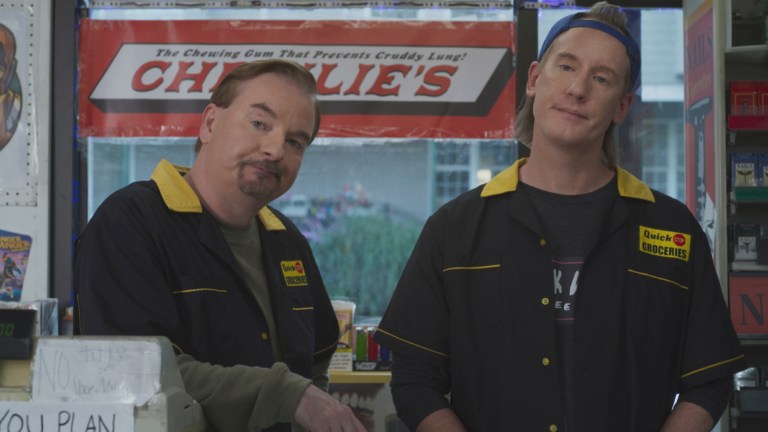Clerks III Review: Kevin Smith Closes Up Shop with Grace
With Clerks III, writer-director Kevin Smith wraps up the story of his favorite convenience store workers on a familiar, and poignant, note.

The more things change, the more they stay the same. That may be the overriding theme of Clerks III, the third, and perhaps final, entry in writer-director Kevin Smith’s Quick Stop convenience story trilogy that has been the anchor for nearly his entire canon of films.
While certain life-shaking events have taken place in the 16 years since Smith made Clerks II—events which we won’t reveal here—the new movie gets the most mileage out of familiar situations and characters in the orbit of the Quick Stop, the fictional New Jersey store based on Smith’s own early work history at a convenience store before he became a filmmaker.
Yet while the film retains much of the often coarse, crude humor of many of Smith’s earlier View Askewniverse movies, and while his filmmaking style still usually hinges on long, static shots of people just standing around and talking, there are enough narrative developments, as well as an overall sense of melancholy, to give Clerks III more than a dollop of, dare we say, gravitas.
As the film opens, Dante Hicks (Brian O’Halloran) and Randal Graves (Jeff Anderson) are still ensconced at the Quick Stop, having reopened it at the end of Clerks II while Jay (Jason Mewes) and Silent Bob (Smith) are in charge of RST Video next door (it’s now a weed dispensary). But when Randal suffers a heart attack it leads him to reconsider his life and priorities. He decides that he’ll become a filmmaker, writing and directing a movie about his and Dante’s experiences and lives at the Quick Stop.
Dante is put in charge of raising money for the film, auditions are held to play all the lead roles, and as filming begins, it soon becomes apparent that what Randal has written is actually the in-universe version of the original Clerks, right down to it being shot in black and white and inside the store. It’s an amusing conceit which brings Smith’s entire universe full circle.
The usual shenanigans ensue, as a parade of actors/characters from the previous Clerks films—Becky (Rosario Dawson), Elias (Trevor Fehrman), Veronica (Marilyn Ghigliotti), etc.—show up for dutiful reprisals of their roles while the list of cameos include Ben Affleck, Justin Long, Amy Sedaris, Sarah Michelle Gellar, Danny Trejo, and Fred Armisen, among others.
At this point, you’re either with Smith and his aesthetic or not (although even he says he lost some hardcore fans over his massively panned 2016 horror comedy, Yoga Hosers), and his catch-as-catch-can, casual approach to shooting and assembling a motion picture is either permanently endearing or endlessly irritating.
Either way, the first movie remains both his best and a genuinely funny cult classic in indie cinema, and Clerks III does manage to coast on the affection and familiarity folks have for that classic, as well as his core band of characters and performers. It also builds on that (as much as it can given Smith’s limitations as a writer and director) by channeling some of the terror he must have felt when he thought he might not make it through the night more than four years ago.
No one would accuse any of this cast of being truly top-shelf actors, but O’Halloran, Graves, Mewes, and Smith himself all inhabit their roles comfortably while Dawson and Fehrman bring the earthiness and wackiness that made them stand out in Clerks II.
The fact that no one is trying to hide their age in the movie also adds to its underlying poignancy. One has always gotten the sense that Smith just likes to get his friends together and have fun, and say what you will about his output, that feeling always seems to come through in his View Askewniverse films, even as it might get harder to put the band back together.
In the end, it makes for a surprisingly emotional finale (and it does seem like one) to the Clerks saga. You may find yourself genuinely moved by some of the more unexpected developments, some raw moments from both O’Halloran and Graves, and the sense that this one is exceptionally personal to Smith himself. Nearly three decades after the original arrived, that may be all we need.
Clerks III is in theaters this week in a limited engagement.
